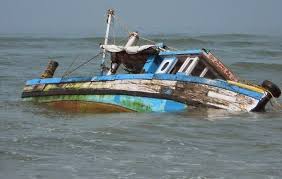About 92 passengers have reportedly died in different boat accidents across Nigeria between January and August 2025, despite ongoing efforts by the Federal Government to improve safety on the nation’s waterways.
The accidents were recorded in several states, including Rivers, Niger, Sokoto, Kwara, and Zamfara, raising fresh concerns about the persistence of unsafe water transport in riverine communities.
The Minister of Marine and Blue Economy, Adegboyega Oyetola, in a statement on Sunday, appealed to state governments to begin phasing out wooden boats, which he described as unsafe for modern use. He said many of the fatal mishaps were linked to the continued reliance on wooden boats that are often overloaded and structurally weak.
An analysis by The Source from media reports and government statements showed that the accidents occurred throughout the year. In January, a boat capsized near Bonny Island in Rivers State, leaving three people dead, including a toddler, while 19 others survived.
On May 15, tragedy struck in the Gbajibo-Mudi area of Kwara State when a passenger boat capsized on the Niger River during a storm. Twenty-seven people, who were returning from the market, lost their lives.
In July, another passenger boat, which was heading to a market near Gumu village in Shiroro area of Niger State, capsized, with at least 13 people feared dead.
The situation worsened in August with multiple incidents. On August 17, a boat carrying more than 50 passengers capsized at Goronyo market in Sokoto State. Two days later, 25 passengers were still missing while 25 others were rescued. On August 22, another canoe accident occurred in Faji community, Sabon Birni Local Government of Sokoto State. Six people died while three passengers were declared missing.
In Zamfara State, on August 30, at least 13 people died and more than 20 were reported missing when a boat carrying villagers fleeing insecurity capsized. However, The Nation reported later that the death toll had risen to 16.
The most recent incident was confirmed by the National Inland Waterways Authority (NIWA) at the Jaranja River in Shagari Local Government Area of Sokoto State. According to NIWA Area Manager in Sokoto, Mr Bala Bello, two persons died while nine survivors were rescued. Bello blamed the accident on negligence, canoe overloading, and violation of safety rules.
Earlier in May, Minister Oyetola had flagged off the distribution of 42,000 life jackets across 12 riverine states, a project that started in Minna, Niger State. Each beneficiary state was allocated 3,500 life jackets in the first phase. The initiative, according to the ministry, was part of efforts to reduce fatalities on waterways.
While commiserating with victims of the Jaranja River accident, Oyetola insisted that safety campaigns alone would not stop the trend if wooden boats remained in use. He described them as structurally weak, unsafe for modern haulage, and a major cause of deaths on waterways.
“Wooden boats have served their time, but they cannot be the future of water transport in Nigeria. We must now chart a safer course for our people,” Oyetola said, urging state governments to invest in fibre and aluminium boats that are sturdier and safer.
The minister also stressed that although the Federal Government had made the use of life jackets compulsory, enforcement and safe boats must go hand in hand.
Supporting his position, Chairman of the United Waterways Passengers Association, Mr Gbenga Oluwadiya, said the distribution of life jackets was a good move, but urged the government to ensure strict enforcement. “The government needs to do more on enforcement of the use of life jackets,” he said.
On his part, President of the Barge Operators Association of Nigeria, Mr Olubunmi Olumekun, called for a clear separation of passenger boats from cargo boats. He warned that using the same boat for both goods and passengers increases the risk of overloading and accidents.
“You cannot load people and also carry full loads of goods in the same boat. Passenger boats should be for passengers alone, and goods should have their own boats. That is the only way to control overloading,” Olumekun stressed.
Despite government interventions, the rising number of casualties shows that Nigeria’s inland waterways remain unsafe. Stakeholders say only a combination of modern boats, compulsory life jackets, strict enforcement, and better regulation can stop the recurring tragedies.
